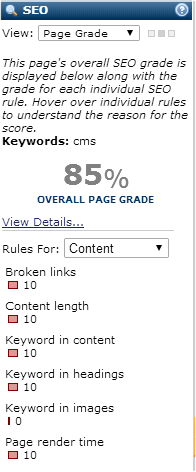
CommonSpot includes tools for efficiently managing and tracking SEO keywords to improve rankings in search engine results pages (SERPs). Expand the Search Engine/SEO section of the Site Administration Dashboard, as shown below, to:
Only users with Manage SEO rights granted through Site - General Security can see the site-level Search Engine/SEO options.

An SEO Reporting Group is a collection of:
Depending on the size of your site and your SEO goals, you may create one or more SEO Reporting Groups. For a simple site, you will probably configure just one reporting group that is bound to the root of your site and that includes all child subsites. For a larger site, like a university, you may have several SEO Reporting Groups. For example, the Alumni department might have one set of keywords to target and track, while the Admissions department has a totally different set. In this case, you would create a Reporting Group for each set of targeted keywords and associate it with that portion of the site (www.my_site.edu/alumni vs www.my_site.edu/admissions). Each Reporting Group can have a different set of rules, separate administrators and group-specific security permissions for adding, editing, and viewing reports.
To manage a site’s SEO reporting groups, select the SEO Reporting Groups option from the Search Engine/SEO section of the Site Administration Dashboard, as shown above.
Enable search engine reporting by creating groups of categorized keywords whose rankings you want to track. These groups are called SEO Reporting Groups in CommonSpot. SEO Reporting Groups are a collection of targeted keyword and page grading rules which are associated with a section of your site.
Through the SEO Reporting Groups menu you can:
 Important Note: Rank tracking and rules analysis require configuring and running these site-level scheduled jobs: Track SEO Keyword Rankings and Run SEO Rules. See Scheduled Job Definitions.
Important Note: Rank tracking and rules analysis require configuring and running these site-level scheduled jobs: Track SEO Keyword Rankings and Run SEO Rules. See Scheduled Job Definitions.
Part of improving rankings for targeted keywords is making sure that your content meets the specific criteria that search engines deem important. For example, because search engines assign a high weight to page title, ranking results will typically improve if your page titles include the keyword or keyword phrase that you are trying to rank for.
To ensure that your content is optimized for search engines, you can apply rules that score and grade specific page content and metadata components and give contributors recommendations to improve overall page score.
CommonSpot ships with over dozen predefined rules that are commonly used to improve SEO page performance. You can also create and register your own rules. As contributors modify content or metadata properties for a page, CommonSpot runs page grade rules and returns feedback and recommendations for improving page content based on how well content changes meet rule criteria.
Note that SEO rule are defined site-wide through Site Administration -Search Engines / SEO - Page Grading Rule Definitions.
For each SEO Reporting Group, Reporting Group administrators can:
CommonSpot rule definitions are small CFC modules that are implemented to a particular interface, meaning that the developer must implement certain methods that will be called. By default they are stored in the site’s /cs_customizations/seo/rules/ directory at the site root. CommonSpot ships with a set of definitions for rules that are commonly used to improve SEO page performance. You can also create and implement your own rules and properties using the interface documented in the CommonSpot Developers Guide.
Each rule has a set of predefined properties, one of which defines what the rule "Applies to." There are three types of rules:
Depending on rule type and the kind of data/content changes introduced, CommonSpot runs each rule to get a score for each targeted keyword assigned to the page/document. Scores are returned as numeric values between 0 and 10.0, with 10 high and 0 low. Sites can optionally apply weight multipliers to give more importance to certain rules. CommonSpot calculates all scores and applies the appropriate weighting for each rule to return an overall Page Grade as a percentage of actual score compared to the total possible score.

Reporting Group administrators can review comprehensive reports on how published pages fared for each rule and which pages have deficient scores. See the description of reports in the SEO Administration Dashboard and SEO Administration Menus.
Contributors to specific pages can see the page’s current grade, and scores for each individual rule, and can see both "pre"and "current" change scores when editing content to see how updates affect SEO score. CommonSpot also provides recommendations for how to improve content/metadata for optimal results. See Create New Page in the Contributor's Reference and SEO Field Help.

Rules run under the following conditions:
Applies to content when:
Applies to Standard metadata when:
Applies to a URL when:
Rules also run when:
Related Links
You can download PDF versions of the Content Contributor's, Administrator's, and Elements Reference documents from the support section of paperthin.com (requires login).
For technical support: